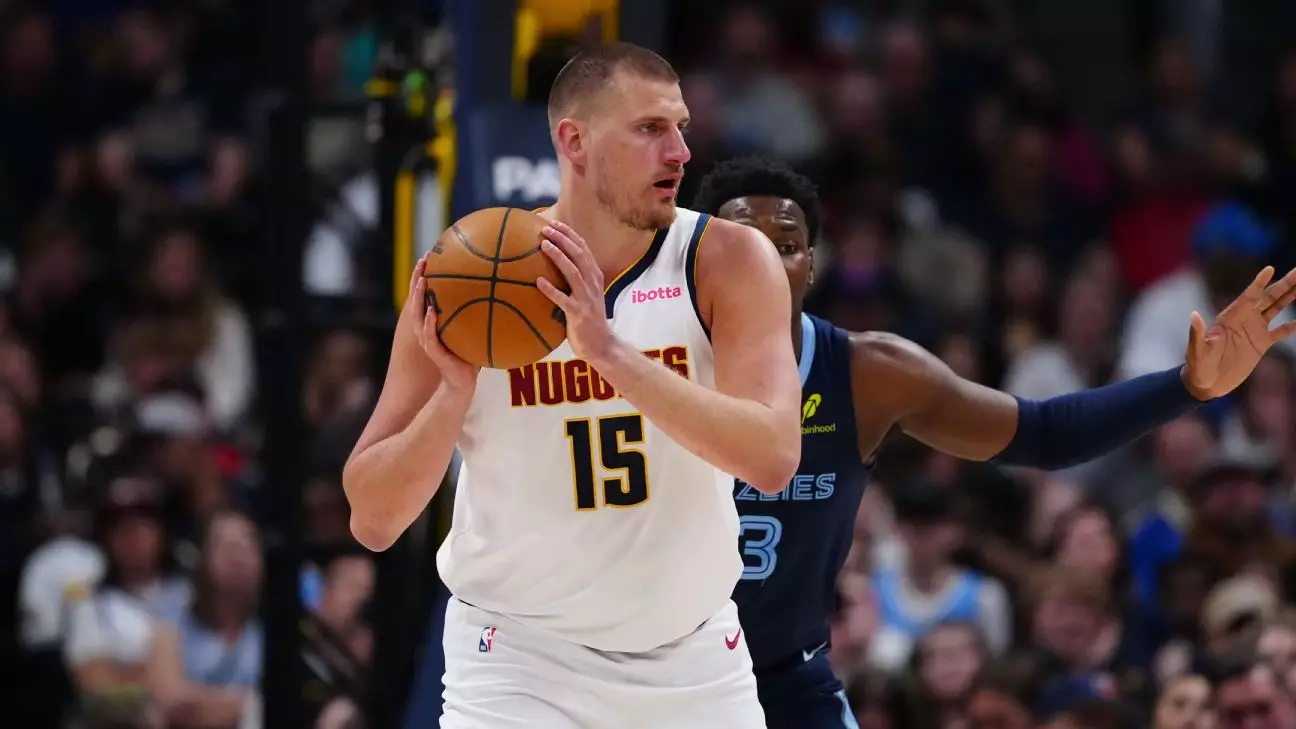In the pantheon of basketball excellence, certain feats stand out as monumental tributes to a player’s versatility and prowess. Nikola Jokic has recently etched his name in the annals of NBA history by achieving a remarkable triple-double average for the season. With his outstanding performance and statistical dominance, he has granted basketball fans a glimpse into the future of the game—a future where traditional roles are redefined, and skills from various positions are blended seamlessly. As Jokic continues his journey, it becomes clear that he is not just a player; he is an embodiment of basketball’s evolution.
Breaking Records and Setting Standards
Jokic secured his status as only the third player in NBA history to average a triple-double over an entire season when he registered his 700th assist in the Denver Nuggets‘ 117-109 victory against the Memphis Grizzlies. That single moment propelled him into an elite class alongside the legendary Russell Westbrook and Oscar Robertson. While both Westbrook’s and Robertson’s achievements are monumental, what sets Jokic apart is his innate ability to merge creativity with effectiveness, allowing him to command the court while relentlessly pursuing victory.
On that fateful night against Memphis, Jokic did not just meet the statistical bar; he soared above it with a dazzling performance that included 26 points, 16 rebounds, and 13 assists, marking his astounding 34th triple-double of the season. The importance of his performance cannot be overstated, especially when one considers the context—a modern NBA where the emphasis on scoring often overshadows more holistic, team-oriented play.
What Makes Jokic Unique?
One might wonder what distinguishes Jokic from his contemporaries. While Westbrook is known for his explosive athleticism and relentless intensity, and Robertson was a pioneer of an era, Jokic represents a different kind of basketball genius. His approach fuses an extraordinary court vision with an unassuming composure, allowing him to orchestrate the game. In a post-game interview, he displayed the humility and modesty that are often absent from the modern athlete’s narrative. „It’s nice. I didn’t do that before,“ he stated simply, acknowledging the weight of his accomplishment without letting it cloud his perspective.
In an age where flashiness often captivates attention, his gameplay reflects an intellectual understanding of the sport that is revered by those truly in tune with basketball’s intricacies. It’s not just about the numbers; it’s about the impact he has on his teammates. Coaches and analysts alike recognize that Jokic’s playmaking abilities elevate the performance of everyone on the floor, creating a synergy that is crucial for a championship-contending team.
A Season for the Ages
As the season enters its final stretch, Jokic stands poised to achieve even greater heights. With aspirations to average 30 points per game and break personal records in several categories, the stakes are high. His ability to not only lead in assists but also maintain a prolific scoring average signals an unprecedented accomplishment that will resonate through the history of the league. Expectations loom large, and yet, he remains focused on what he does best: facilitating, creating, and leading his team.
Onlookers cannot help but liken this moment in Jokic’s career to the lofty narratives of basketball’s finest. If he succeeds in hitting that 30.0 points-per-game milestone, he will join the exclusive company of Westbrook and Robertson in an elite statistical club that many consider the pinnacle of individual achievement.
The MVP Battle: A Test of Recognition
However, one of the most compelling subplots of Jokic’s historic season is the looming MVP debate. As he continues to dazzle on the court, discussions around his candidacy for this year’s MVP award are intensifying. Nuggets interim coach David Adelman echoed a sentiment shared by many when he said, “If he doesn’t win the MVP, it’s the greatest season of all time not to win the MVP.” This statement resonates powerfully in the basketball community, revealing a disparity between statistical success and recognition that often plagues deserving players.
As he goes toe-to-toe with Oklahoma City’s Shai Gilgeous-Alexander for the coveted MVP title, the question remains: Will Jokic’s unprecedented season be enough to bestow upon him the honor he so richly deserves? Regardless of the outcome, one thing is clear: Jokic’s contribution to the game transcends individual awards; it lays the groundwork for future generations to approach the sport in new and innovative ways.
In a world where individual performances often eclipse the beauty of teamwork, Jokic’s brilliance serves as a poignant reminder that basketball is, at its core, a collective endeavor—a testament to skill, dedication, and shared purpose. In witnessing his accomplishment, we are not simply observing history; we are witnessing the dawn of a transformative era.


Napsat komentář